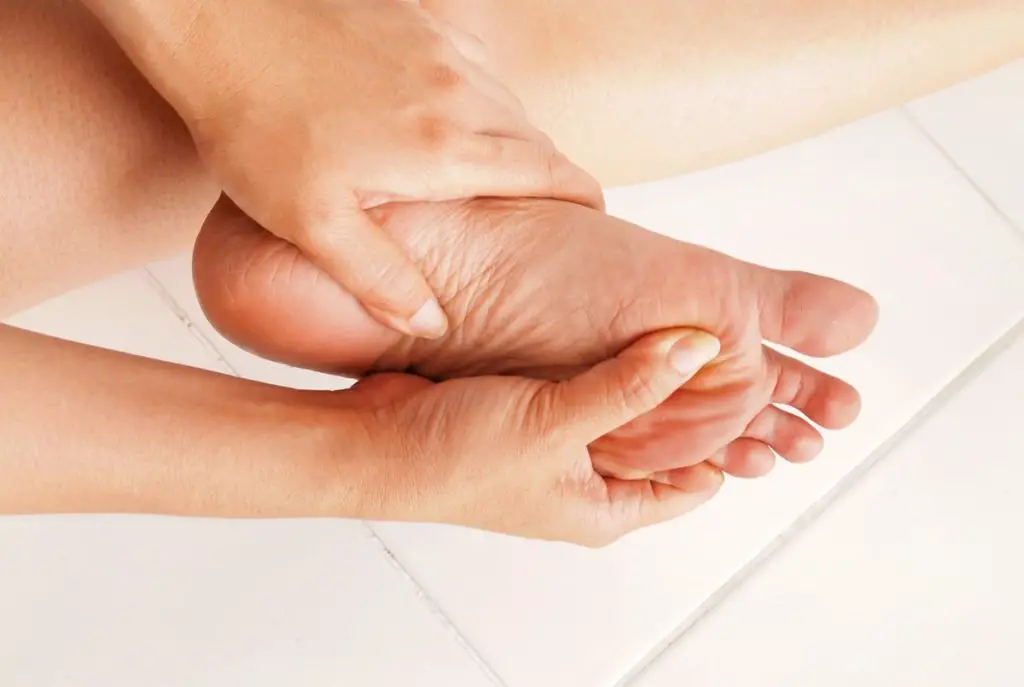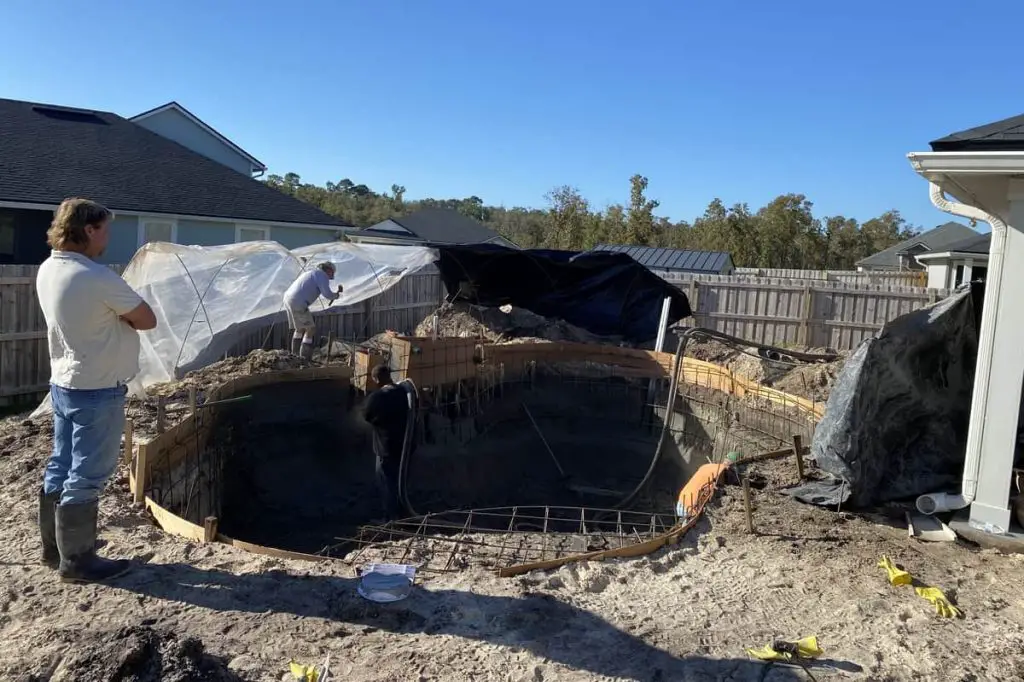It’s summer- everyone’s having a blast in your backyard pool. However, some guests emerge from the pool complaining about its course floor. Can your gunite pool be that rough on feet?
Gunite pools are rough on feet because of the coarse aggregate in concrete. The crushed stone and gravel pieces create a rough surface that can irritate bare feet. Pool surfaces are normally finished, but coatings like plaster erode over time and become sharp.
However, there’s more to rough pool surfaces than just gunite! I will delve into greater detail below.

Concrete Pools: Gunite and Shotcrete
Concrete pools come in two main types: gunite and shotcrete. Gunite begins as a dry mixture. It mixes with water as it leaves the nozzle to create a wet concrete-like substance. On the other hand, shotcrete begins as a wet mixture before reaching the site.
Gunite and shotcrete have their pros and cons. However, what concerns us is whether one concrete type is rougher.
Both gunite and shotcrete are concrete. Your feet won’t discriminate between the two and will likely find either surface rough. Any difference gunite and shotcrete have in roughness could be attributed to the pool builder’s workmanship.
Reasons Your Pool May Feel Rough
Unfinished or exposed gunite pool surfaces aren’t alone in irritating feet. People rarely, if at all, swim in unfinished concrete pools. Pool surfaces can be rough due to scale buildup, problematic finishes, and poor construction, among other things.
Hard Water and Scale Buildup
Hard water is pool water that contains high levels of dissolved minerals. If left unchecked, these minerals can cause scale buildup.
Scale buildup is composed of mineral deposits, usually calcium carbonate, that form on pool surfaces. The mineral deposits create a rough surface that can make swimming uncomfortable.
Not all water sources have the same level of dissolved minerals, so some pools have worse scale problems than others.
Lowering Pool Hardness
Getting rid of hard water can be as easy as draining and refilling your pool with fresh water. However, your water source might be high in mineral content.
Fortunately, pool test strips are readily available to assess your water’s hardness. If you’re not happy with the test results, you can run your hose through a filter to soften your water.
Your chlorine levels may also be too low. Chlorine affects pH levels, leading to calcium buildup when they’re out of balance.

Soft Water and Corrosion
In contrast to hard water, soft water is low in mineral content. While it sounds good, soft water is corrosive. It will remove minerals from your pool’s surfaces, damaging them. Distressed and pitted pool surfaces aren’t friendly to swimmers’ hands, elbows, or feet.
Increasing Pool Hardness
You can increase your pool’s hardness by adding calcium chloride to your pool. The downside is that it will also increase your pH levels.
If you’re not happy with your current pH level, you can add soda ash to lower them. Just be careful not to add too much, as it will also affect your chlorine levels.
Pool Needs Resurfacing
Much like how roads eventually develop potholes, pool surfaces deteriorate over time. It doesn’t matter whether your pool finish is plaster, quartz, or tile. On top of that, the corrosive soft water mentioned earlier degrades your pool surface even quicker.
In any case, the time will come when your pool finish will need resurfacing.
Signs of Distressed Pool Surfaces
Wondering if you’re overdue for a resurfacing? Here’s what to look out for:
- Rough to the touch. Soft water can do a number on your pool surface. Your foot’s sensation on the degraded pool floor can attest to this.
- White powdery residue. This substance will be hard to miss as it will appear all over, from the pool walls to the ladder. It’s also a telltale sign of scale buildup.
- Damaged grout. Tile finishes are prone to this type of damage in which the grout between tiles starts to break down and crumble.
- Water level drop. Water is constantly pushing against all pool surfaces. Your pool might have sprung a leak somewhere you don’t know about.
The more signs you see, the likelier you’ll need to seek professional help.
Going for a New Finish
Since you’re resurfacing the pool anyway, you might consider a different finish than the one you had. Here are some options to consider:
- Plaster is a common, affordable pool finish, and it’s available in a variety of colors. It’s durable but can be susceptible to staining.
- Aggregate is a mix of plaster, pebbles, and glass. It’s non-porous, making cleaning a rare need. Aggregates can come in quartz, marble, pebble, and glass bead.
- Tile is quite durable and available in a variety of colors and styles. It will likely not need resurfacing, or at least not as often, assuming you maintain the pool well. Note the price tag, though.
Every pool finish has its pros and cons. Talk to a professional about the best fit for your needs and budget.
Bad Workmanship
Sometimes, it’s not the rough pool surface but the workmanship that went into building it.
Concrete didn’t cure properly?
Well, that explains the chasm-sized crack in the pool floor.
Poorly applied plaster finish? That’s why the walls are constantly flaking.
Get a qualified professional to build your pool and save yourself headaches down the road.
Swimmer Biology, Wellness, and Habits
Finally, it’s worth noting that different swimmers have different anatomies and lifestyles.
- People accustomed to walking barefoot develop tougher soles allowing them to grip the pool floor better.
- Very young swimmers have more tender feet and are more susceptible to skin abrasion.
- Others might be used to swimming in chlorinated water, and their skin can handle the contact better.
In any case, you don’t have to let your rough pool surface keep you out of the water. Just be smart about it and take into account your own body when swimming.
Conclusion
Gunite pools are rough on feet; unfinished concrete pools in general are. But poorly maintained pools can be just as abrasive. Pool owners need to realize that learning about correct pH levels and pool resurfacing are part and parcel of pool ownership.
If you’re addressing your pool’s roughness but would still like to take a dip, might we suggest pool shoes in the meantime?
Sources
- Poolonomics: Gunite Pools: 5 Things You Should Know
- Hobert Pools: What’s The Difference Between Gunite and Shotcrete?
- Pool Owners Academy: The Leaked Secret To Calcium Buildup In Pool – How To Get Rid Of It Discovered
- Cleanup Expert: Swimming pool hardness can destroy your pool and its components. Avoid this through proper balance of your pool chemistry.
- FROG: Total Hardness information for balancing your pool
- Classic Marcite: Pool Resurfacing 101: Does Your Pool Need to Be Resurfaced?
- ReefTropical: How to Tell if Your Pool Needs Resurfacing (5 Sure Signs)
- Poolonomics: What Are The Best Types of Pool Finishes? (Comparison)
- NewScientist: Barefoot walkers have tough feet but sense the ground just as well
